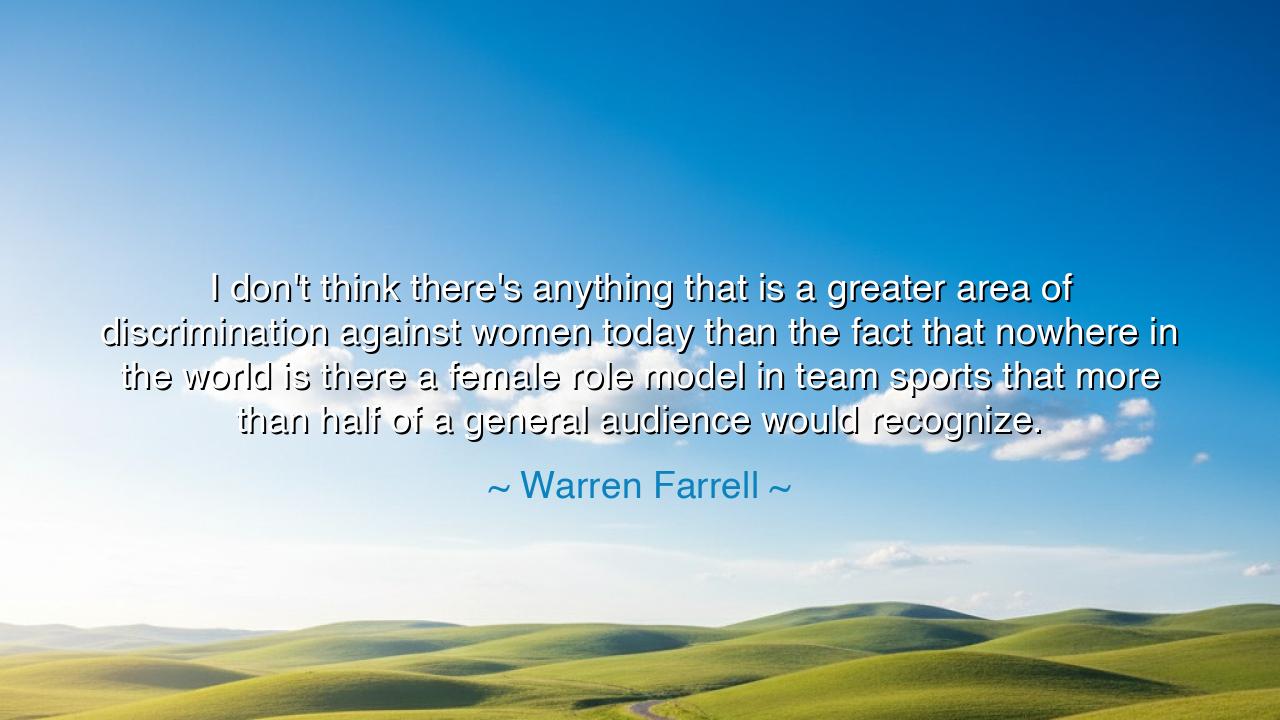
I don't think there's anything that is a greater area of
I don't think there's anything that is a greater area of discrimination against women today than the fact that nowhere in the world is there a female role model in team sports that more than half of a general audience would recognize.






The words of Warren Farrell strike like a bell that awakens the slumbering conscience of society: “I don't think there's anything that is a greater area of discrimination against women today than the fact that nowhere in the world is there a female role model in team sports that more than half of a general audience would recognize.” These words pierce through the illusions of progress, for though women now enter arenas once closed to them, the recognition of their greatness still lags behind. A tree may grow strong, but if it stands hidden in the shadows, who will marvel at its beauty? So it is with the female athlete, who shines with skill and power, yet remains unseen by the eyes of the many.
The meaning here is profound: true equality is not only the opportunity to play, but the honor of recognition. To be a role model is to stand as a beacon, a figure who shapes the imagination of the young and inspires the courage of those who watch. Men in sports have long carried this mantle — Michael Jordan soaring through the air, Lionel Messi weaving through defenders, Tom Brady commanding the field. Their names echo across nations, their faces known even to those who do not follow the game. But where is the woman whose fame rivals theirs? Where is the heroine known by more than half of the world’s audience? Her absence reveals the silence of injustice.
History gives us glimpses of such women. Consider the courage of Billie Jean King, who in 1973 faced Bobby Riggs in the “Battle of the Sexes.” Before a crowd of millions, she defeated him not merely in tennis, but in symbolism, proving that women could compete with men under the weight of the world’s gaze. For a moment, she stood as a role model whose name and face transcended boundaries. Yet her fame, though powerful, did not ignite a lasting culture where women in team sports were equally uplifted. The world applauded the spectacle, then returned its gaze to the male-dominated stage.
The origin of Farrell’s lament is rooted in the truth that visibility shapes destiny. Children dream of becoming what they can see. If they see only men lifted as champions, then the girl with a ball in her hands will wonder if her dream is worthy, and the boy will fail to recognize her as his equal. This is not merely a matter of fairness to athletes, but of shaping the collective imagination of society. For without visible heroines, we rob the world of half its inspiration.
The ancients knew well the power of exemplars. The Greeks told tales of Achilles and Odysseus, but they also honored Atalanta, the swift-footed huntress who could outrun any man. Her story endured because it was told, because it was given weight and recognition. Yet in our modern age, though women fill stadiums and win trophies, their names are too often swallowed in silence. The tale is not told, the honor not shared, and thus the injustice endures — not of absence, but of invisibility.
The lesson is clear: we must not only allow women to play, we must celebrate them loudly. Media must give them the stage, fans must honor their victories, and institutions must invest in their visibility. Parents must tell their daughters the names of the heroines who play today, so they know their dreams have flesh and blood. Recognition is not a gift; it is a right. And to deny that right is to keep women forever in the shadows, no matter how brightly they shine upon the field.
So let us act with urgency. Watch the games of women as you watch the games of men. Speak their names, celebrate their victories, demand their stories be told. For the future of equality lies not only in law, but in imagination. And imagination is fueled by the heroes we lift up to the sky. Let us then lift the women who play, who coach, who fight, until their fame is as natural as the sunrise. Only then shall the lament of Warren Farrell be silenced, and the world see clearly that greatness knows no gender.
Thus, this quote becomes not merely a complaint but a summons: to create a world where every child, boy or girl, may look upon the field of play and know a champion who reflects their face, their spirit, their possibility. And in that day, discrimination will not merely be lessened; it will be overcome by the light of recognition.






AAdministratorAdministrator
Welcome, honored guests. Please leave a comment, we will respond soon